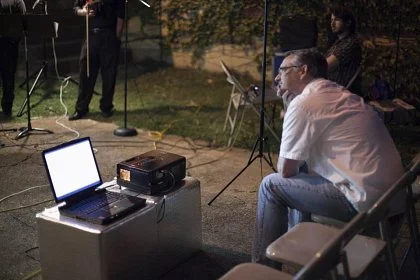Architect Lesley Beeman has filled a music niche in Nashville, bringing together great thinkers with composers for a night of unforgettable performances and discussions since 2010.
Lesley Beeman
How did the idea for Indeterminacies come about?
I was organizing a program I called Oblique Strategies, after an idea by Brian Eno, for the local chapter of the American Institute of Architects. The thought was to talk about design and architecture obliquely from a viewpoint such as archaeology or cooking or physics or medicine.
One program featured a discussion of criticism featuring philosopher, Jonathan Neufeld, using music played by members of the Alias Ensemble. During that program I had a kind of epiphany watching the cellist play more easily recognizable music against some very new music. The nature of the discussion changed from “How did he play this tune we all know?” to a deeper dive into the nature of the music itself. From there we started the Indeterminacies program as a way to dig into new music and find a foothold for understanding it.
Stan Link, 2015
What does Indeterminacies mean?
An indeterminate structure as defined by composer John Cage is, "the ability of a piece [of music] to be performed in substantially different ways." I’ve always seen it as a structure that has a bit of chance built into it. For instance, you can precisely design a series of occurrences to behave a certain way, turn them all loose at the same time in the same space, then watch/listen for new and unexpected patterns to emerge in the intersections. So Indeterminacies was designed to allow space for the un-predicted and for wonder. We told our artists Indeterminacies was the place where you could do that thing you never thought you could do anywhere.
What types of musicians do you showcase?
We sought out performers and composers who were operating at a high level in the frontiers of music. We featured music from sound manipulation using electronics, a’la Joo Won Park, to tightly written string quartets performed by the Blakemore Trio, to the completely improvised music of LaDonna Smith and Davey Williams, to solo tuba from Mark Snyder. I always wanted to find a rock band that would fit into the program.
What has been your most memorable performance?
Rodger Coleman
Everyone who participated has been amazing. But if I have to choose, perhaps it’s the one in which I was most involved in the program’s birth. Portara New Music Quartet’s performance of David Lang’s “The Little Match Girl Passion.” John Pitcher’s discussion got right to the heart of the music and what Indeterminacies was all about.
The performance where I felt we most effected a paradigm shift for an audience member was the Rodger Coleman and Sam Byrd program with dancers from what would later become New Dialect. One member of the audience clearly had no idea what to expect (not that we did either) and didn’t understand what was happening. Sam and Rodger played a huge mass of improvised sound on piano and percussion while the dancers improvised their movement. During the discussion you could see a light click on as the audience member tried to come to grips with what she’d heard and seen. I hope it changed the way she listens. Again, this was a program where the discussion, led by Stan Link, was illuminating and struck right at the center of the performance when Stan asked, “How do I know this music was improvised?”
Mark Snyder, 2011
Stan Link, Associate Professor of the Philosophy and Analysis of Music at Vanderbilt’s Blair School, has been a guiding light for the series. In addition to being an outstanding and extremely relevant composer/performer, Stan provided us with the perspective of a contemporary music community that was looking to break out of the performance hall, find new audiences, and new platforms for critical discussion.
Rodger and Sam’s Indeterminacies performance was documented on their CD release “Indeterminate” available at CD Baby. The liner notes have a great discussion of the program.
Joo Wan Park, 2013
Who makes up the audience?
A lot of musicians, people who live with musicians, and people whose brains operate differently than most other people’s brains. The works we offered were often unfamiliar to most people, so the best audiences were those who had to work to let the music into their psyche and then left thinking about music a little differently than they did when they arrived.
What has Indeterminacies done that nobody else in Nashville is doing?
At the time we were not the only program featuring the kind of music we were doing, but we were one of very few. Tony Youngblood, Chris Davis, Alias Ensemble and other pioneers were out there long before us. Our “hook” was the way we used the music as a catalyst for directly engaging our audience in discussion and criticism.
Tristan Perich, MoMA, via NYTimes
What are some of the things Indeterminacies artists have gone on to do?
Most are still performing and innovating and teaching. OZ Arts Nashville invited Ethel String Quartet to perform for the venue’s debut season. Tristan Perich got solo shows at MoMA and MASS MoCA. Ingrid Laubrock and Tom Rainey will be performing with Anthony Braxton at this Knoxville’s Big Ears Festival this year. Banning Bouldin started the New Dialect dance troupe, Rodger Coleman (who had not performed live since 1995 at his Indeterminaces debut) has gone on to record at least two albums and performs fairly often around Nashville.
The next Indeterminacies will take place on Sunday, February 28th at 7pm at Zeitgeist and feature Mark Snyder playing songs from his new record. Dr. Snyder is Assistant Professor of Music at the University of Mary Washington teaching courses in electronic music, composition and audio production. More info here.






